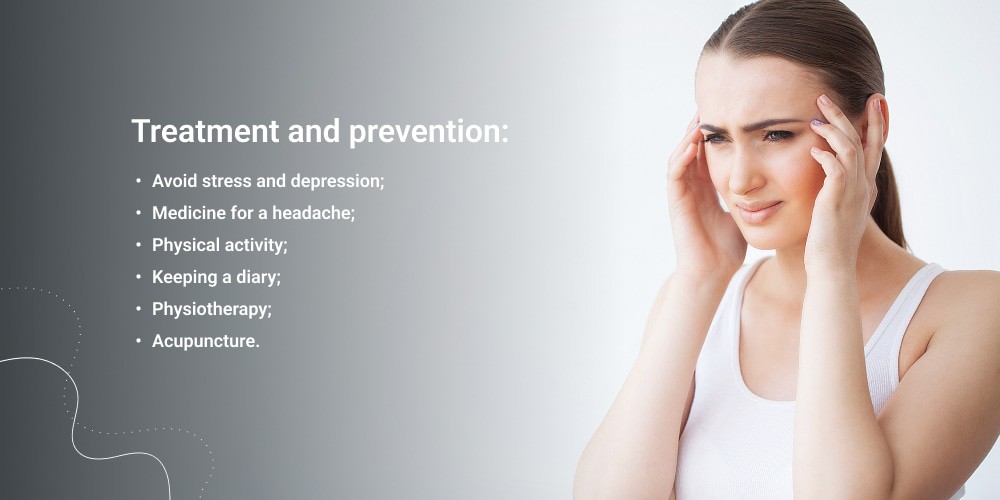You’ve probably heard of tension headaches. This is a problem that affects a large number of people. As a rule, this means chronic headaches that appear more than 15 times a month.
Among the causes of tension headaches are fatigue, long work at the computer, hunger, and stress. Also, some patients face a similar problem due to the fact that they consume too much caffeine, and alcohol, or, on the contrary, drink too little water.
As a rule, if there are no extraneous symptoms and the pain is moderate, the doctor can assume at the very beginning of the research that you have a tension headache. However, you may also be given referrals for diagnostic tests to confirm the diagnosis.
After your doctor ensures you have a tension headache, you may be prescribed certain medications or other therapies.
In this article, we will look at the main diagnostic methods that allow you to identify tension-type headaches and how to get rid of a tension headache.
Tension Headaches Diagnosis
Before your doctor can give you specific advice, he should correctly diagnose you. To do this, you will go through several stages of diagnostics. The first stage of the examination will be a conversation with a specialist who will ask you several necessary questions. For example, you may be asked to describe your tension headache, giving detailed characteristics in terms of intensity and frequency of attacks. It will also be important for you to note whether there is pain during sleep or only during the daytime. Show the exact location where your head hurts. These are all important points to note during the consultation to get a more accurate diagnosis.
If the doctor doubts the diagnosis he intends to give you, he may order additional tests. Most often, this includes tomography. This method allows you to exclude the appearance of a tumor in the brain and, in general, to see its condition. There are 2 types of tomography. Let’s look at both options to understand how they differ:
- Magnetic resonance imaging (MRI). This type of diagnostic uses a magnetic field, radio waves and computer technology to obtain images that characterize the state of the brain.
- Computed tomography (CT). This is a diagnostic imaging procedure. During this type of study, a number of computer x-rays are used. It helps to get a comprehensive view of your brain.
Treatment and Prevention of Tension-Type Headache (TTH)
At this stage of the article, it is worth considering methods for treatment and preventing such a problem as a tension headache. This type of headache often occurs due to frequent stress, long intervals between meals, and lack of proper rest. Accordingly, to prevent the emergence of new headaches, it is worth addressing the appearance of stress and tension in your life that will bring you headache relief. We will tell you about various relaxation techniques and some other methods can help you with this.
If you already have tension headaches, you most likely want to know what drugs can bring relief.
We have prepared for you several cure options and methods for preventing the onset of tension headaches. Let’s take a closer look at them.
Avoid Stress and Depression
Stress and depression are often the causes of tension headaches. Therefore, you should avoid the appearance of stressful situations and reduce their levels if you are still tense. Also, pay attention that you can get tired at your work. Therefore, be sure to find your own relaxation techniques to regain strength and energy after stressful moments. Yoga, meditation, a warm bath, and breathing practices can help you with this. If you often feel the tension even without a serious reason, you should contact a psychologist to work on your thinking and attitude towards life events.
Medicine for a Headache
You can take certain medicine for a headache. Some of them can be bought at the pharmacy without a prescription. However, to purchase some of them, you will first have to obtain the official consent of the doctor. Here are the drug classifications and examples of pills you can buy for headaches:
Painkillers
There are some pain relievers available without a prescription. As a rule, such medicine for headache is taken first of all in the fight against a headache. These drugs include aspirin, ibuprofen and naproxen sodium.
Combined Drugs
Some components that are part of simple painkillers can combine with other components to create combination drugs. So, for example, aspirin can be found in combination with a sedative component, which will help reduce headaches. Combined drugs are more powerful than simple painkillers. Many of these drugs are available without a prescription.
Triptans
If a person has severe migraines or tension headaches, the doctor may prescribe triptans. However, these drugs have many side effects and are also addictive. Therefore, such drugs are not recommended to use when you ask, “How to relieve a tension headache?”.
Physical Activity
Some patients who suffer from frequent headaches say that regular exercise reduces the frequency and intensity of attacks.
In fact, there is no specific reason that would explain why sports help to cope with headaches. Perhaps, in this way, people reduce the amount of stress, relieve tension and therefore prevent the onset of headaches. Also, sports relieve tension in the neck and back, which also prevents migraines. Another reason may be an increase in the number of heart contractions, which leads to a greater enrichment of the body with oxygen.
If you don’t exercise, try adding some physical activity to your life. It could be brisk walking, running, cycling, swimming, or any other activity that you enjoy.
Read about how does lifestyle affect headaches in our other article.
Keeping a Diary
In fact, if you often suffer from a tension headache, try keeping a record of how you feel and other essential things. It is good practice, and you should definitely try it. Get a notebook in which you will write down the date, how you feel, your mood, the intensity of the headache, and which pills you took.
Write down all important details. If you have a new tension headache attack, write about the possible cause and what preceded the attack. Perhaps you argued with someone shortly before the onset of a headache, or you did a lot of work. In this way, you can figure out the possible reasons for your feeling unwell and determine the method that best helps to cope with your problem.
If your doctors have advised you to change your diet, you can note changes in the state in a diary. In this way, you will be able to understand how food affects your well-being.
Your doctor may advise you to take your blood pressure daily and write it down to rule out hypertension. Your diary of well-being can be helpful not only for you but also for your doctor, who will be able to quickly find the cause of your chronic headaches from your notes.
Physiotherapy
It is another method of dealing with chronic headaches you can hear from your doctor. With the help of physiotherapy, you can learn some relaxation techniques and proper breathing.
So, for example, one of the causes of headaches may be poor posture. Physiotherapy, in this case, can also help correct the situation. Daily exercise can significantly improve your well-being.
Acupuncture
It is another modern method of treating some diseases that you may have heard of. As a rule, it is combined with drugs prescribed by a doctor. A combination of pills and acupuncture sessions can also help reduce the tension headache.
Bottom Line
Thus, in our article, we told you about the methods of diagnosis and treatment of tension headaches. The main thing that you should do is to try to lead a healthy lifestyle with enough time for sleep, and rest, as well as follow the right diet and lack of stress in your life. During attacks, you can take some medicine for your headache. However, do not take them more too frequently. You need to get rid of the cause of your headaches, not get used to pills.
FAQs
- What triggers tension headaches?
Tension headaches can be provoked by lack of rest, heavy workload, frequent stress, long breaks between meals, dehydration, and caffeine or alcohol abuse. To get rid of a tension headache, you need to rethink your lifestyle, set aside more time for rest and sleep, and reduce the amount of stress in your life.
- How long can tension headaches last?
Tension headaches can last from half an hour to several days. During the period of pain, you can take a painkiller, but do not use it more than twice a week.
- Why do I get tension headaches every day?
You may have a chronic tension-type headache with which you constantly feel headaches due to stress and fatigue. However, you should see your doctor to rule out dangerous diseases, such as cancer or tumors, which can also cause persistent headaches.
- Should I worry about tension headaches?
Sometimes tension headaches can be associated with a more serious condition, such as a thyroid gland, a tumor, or a chronic migraine. Therefore, if you are faced with frequent headaches, this is an occasion to consult a doctor to diagnose your condition. However, perhaps your problem is only due to the excess stress and lack of rest in your life.












Please, leave your review
Write a comment: